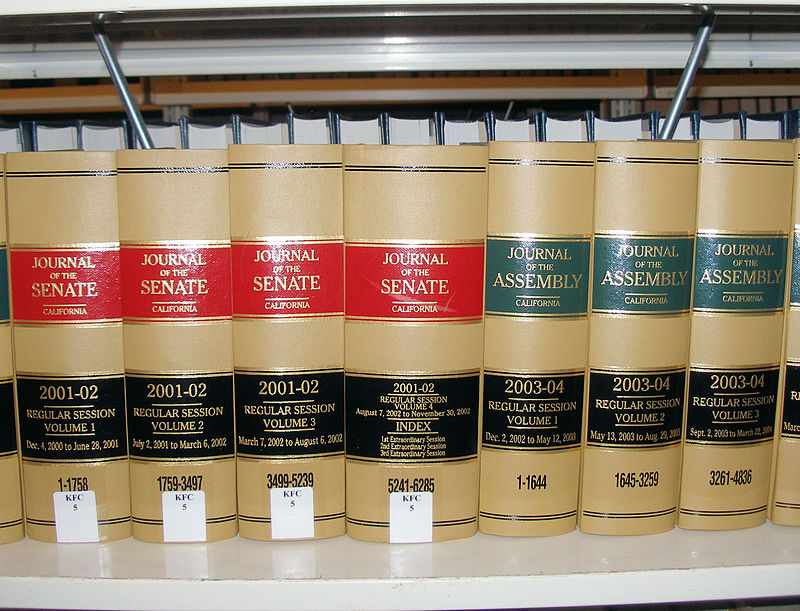
Legal books. (Photo: public domain)
Prohibitions on Specified Officers
Bans all financial interests in any contract made by them in their official capacity
By Chris Micheli, August 25, 2020 6:36 am
Government Code Title 1, Division 4 deals with public officers and employees. In Article 4 of Chapter 1, there are specified prohibitions applicable to specified officers. Article 4 contains Sections 1090 to 1099. These provisions were enacted in 1943.
Section 1090 prohibits Members of the Legislature, state, county, district, judicial district, and city officers or employees from being financially interested in any contract made by them in their official capacity, or by any entity or board of which they are members. In addition, Section 1090 prohibits any state, county, district, judicial district, and city officers or employees from being purchasers at any sale or vendors at any purchase made by them in their official capacity.
In addition, Section 1090 prohibits an individual from aiding or abetting a Member of the Legislature or a state, county, district, judicial district, or city officer or employee in violating this law. Section 1090.1 prohibits any officer or employee of the State or any Member of the Legislature from accepting any commission for the placement of insurance on behalf of the State.
Section 1091 specifies when an officer is deemed not to be interested in a contract entered into by a body or board of which the officer is a member within the meaning of this article if the officer has only a remote interest in the contract and if the fact of that interest is disclosed to the body or board of which the officer is a member and noted in its official records, and thereafter the body or board authorizes, approves, or ratifies the contract in good faith by a vote of its membership sufficient for the purpose without counting the vote or votes of the officer or member with the remote interest. The term “remote interest” is defined in this statute.
Under Section 1091.1, the prohibition against an interest in contracts is not deemed to prohibit any public officer or member of any public board or commission from subdividing lands owned by him or in which he has an interest.
Section 1091.2 specifies that Section 1090 does not apply to any contract or grant made by local workforce investment boards created pursuant to the federal Workforce Investment Act of 1998. Section 1091.3 specifies that Section 1090 does not apply to any contract or grant made by a county children and families commission created pursuant to the California Children and Families Act of 1998. Section 1091.4 defines “remote interest” to include a person who has a financial interest in a contract if specified conditions are met.
Section 1091.5 details when an officer or employee is not deemed to be interested in a contract. Section 1091.6 specifies that an officer who is also a member of the governing body of an organization that has an interest in, or to which the public agency may transfer an interest in, property that the public agency may acquire by eminent domain shall not vote on any matter affecting that organization.
Section 1092 requires that every contract made in violation of any of the provisions of Section 1090 may be avoided at the instance of any party, except the officer interested therein. No contract may be avoided because of the interest of an officer therein unless the contract is made in the official capacity of the officer, or by a board or body of which he or she is a member. An action under this section must be commenced within four years after the plaintiff has discovered, or in the exercise of reasonable care should have discovered, a violation.
Section 1093 specifies that the Treasurer and Controller, county and city officers, and their deputies and clerks are prohibited from purchasing or selling, or in any manner receiving for their own or any other person’s use or benefit any state, county or city warrants, scrip, orders, demands, claims, or other evidences of indebtedness against the state, or any county or city. In addition, individuals are prohibited from aiding or abetting the Treasurer, Controller, a county or city officer, or their deputy or clerk in violating this statute.
Pursuant to Section 1098, any current public officer or employee who willfully and knowingly discloses for pecuniary gain, to any other person, confidential information acquired by him or her in the course of his or her official duties, or uses any such information for the purpose of pecuniary gain, is guilty of a misdemeanor. However, this section does not apply to any disclosure made to any law enforcement agency.
Section 1099 prohibits a public officer including, but not limited to, an appointed or elected member of a governmental board, commission, committee, or other body, from simultaneously holding two public offices that are incompatible. This section specifies that offices are incompatible when any of the following circumstances are present, unless simultaneous holding of the particular offices is compelled or expressly authorized by law:
- Either of the offices may audit, overrule, remove members of, dismiss employees of, or exercise supervisory powers over the other office or body
- Based on the powers and jurisdiction of the offices, there is a possibility of a significant clash of duties or loyalties between the offices
- Public policy considerations make it improper for one person to hold both offices
Pursuant to Section 1099, when two public offices are incompatible, a public officer is deemed to have forfeited the first office upon acceding to the second. However, this section does not apply to a position of employment, including a civil service position. And, this section does not apply to a governmental body that has only advisory powers. Finally, this section codifies the common law rule prohibiting an individual from holding incompatible public offices.
- Committee Versus Floor Lobbying - March 1, 2026
- Fishing Traps in California - March 1, 2026
- What Type of Lobbyist Do You Want to Be? - February 28, 2026



